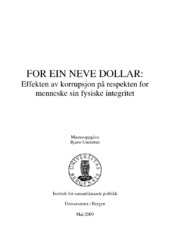| dc.contributor.author | Undertun, Bjarte | eng |
| dc.date.accessioned | 2010-09-07T12:48:59Z | |
| dc.date.available | 2010-09-07T12:48:59Z | |
| dc.date.issued | 2009-05-20 | eng |
| dc.date.submitted | 2009-05-20 | eng |
| dc.identifier.uri | https://hdl.handle.net/1956/4102 | |
| dc.description.abstract | Denne undersøkinga studerer samanhengen mellom korrupsjon og statar sin respekt for individa sin rett til fysisk integritet, også kalla fysiske menneskerettar. Oppgåva spør for det første kva for verknad korrupsjon har på respekten for fysisk integritet, og for det andre om ein slik effekt er avhengig av arten til det politiske regime. Korrupsjon er lite utforska som forklaring på fysisk undertrykking. Oppgåva argumenterer for at dette for ein stor del skuldast at eksisterande forklaringsmodellar sitt perspektiv på staten som ein rasjonell og einskapleg aktør er for snevert. Sidan korrupsjon skjer i forholdet mellom ein agent og ein prinsipal, tek eg tek til orde for å nytte prinsipal-agentteori (PAT) i denne studien. Argumentet er at ein kvar statleg agent med valdskapasitet er ein potensiell krenkar av fysiske menneskerettar, uavhengig av regimets preferansar. Korrupsjon vil auke sannsynet for at fysisk undertrykking skjer, ved å (1) påverke intensiva til desse agentane ved å gjere undertrykking lønnsamt, og (2) redusere den kontrollen (ansvarleggjering) andre statlege organ har med dei aktuelle agentane. Korrupsjon vil difor leie til meir fysisk undertrykking. Argumentet i høve til spørsmål to byggjer på at demokratiske regime er systematiske vernarar av menneskerettane, og at korrupsjon dermed alltid vil vere negativt. Autoritære regime er derimot undertrykkande av natur. Korrupsjon kan difor gjere eit autoritært regimes undertrykking mindre effektiv. Korrupsjon vil slik kunne ha ein mindre negativ, eller til og med positiv effekt på respekten for fysisk integritet under autoritære regime. Argumenta vert testa gjennom ei multippel regresjonsanalyse, med interaksjonsmodellar for å teste om effekten er regimeavhengig. Analysane er gjort i eit utval på 161 land, for året 2006. Utvalet er avgrensa av tilgangen til data. Variabelen respekt for fysisk integritet er henta frå The Cingranelli-Richards (CIRI) Human Rights Dataset, medan data om korrupsjon er henta frå Transparency International sin Corruption Perception Index (CPI). Regimedata er henta frå Freedom House og Polity IV. Analysane syner at korrupsjon har ein statistisk signifikant effekt på respekten for fysisk integritet, og denne effekten ikkje er avhengig av regime, men negativ uansett. Sjølv om undersøkinga er avgrensa i tid, gjev funna ein sterk peikepinn på ei global trend, der korrupsjon fører til fysiske menneskerettsbrot. | en_US |
| dc.description.abstract | This thesis focuses on the link between corruption and governmental respect for the particular type of human rights termed as physical integrity rights. The research question is two-fold: First, what effect does corruption have on governments' respect for physical integrity rights? Second, does this effect depend on the character of the political regime? The thesis takes a Principal-Agent perspective (PAT) to analyze violations of people's physical integrity. Existing theoretical models explaining physical oppression are too concerned with the regime as a single, rational actor, whilst PAT takes account for the fact that corruption takes place between different layers within the state system. In this perspective, any state agent with the capacity of violence is a potential violator. The argument is that corruption increases the probability of physical oppression in two ways. First, by affecting the agents' incentives, so that abuse of power (and hence violence) is considered profitable. Second, by reducing the mechanisms of accountability that restrains the agents. Also, these mechanisms can be regime dependent. Since democratic regimes are essentially protectors of rights, the effect of corruption will always be negative. Authoritarian regimes, on the other hand, are repressive in nature. The effect of corruption in these regimes can therefore be expected to be less significant and even positive, as it reduces the regimes capacity of repression. The arguments are tested in a cross-country multiple regression analysis, also applying interaction models to check for regime dependency. The sample consists of 161 countries for the year 2006. To measure the dependent variable, I use The Cingranelli-Richards (CIRI) Human Rights Dataset physical integrity index. Corruption is measured by the Transparency International's Corruption Perception Index. Democracy is measured using data from Freedom House and Polity IV. The results show that corruption has a statistically significant negative effect on the respect for physical integrity rights, and that this effect is not dependent on the type of regime. Thus, support is found for the argument that corruption increase the chance of physical oppression, though this do not vary between democratic and authoritarian regimes. | en_US |
| dc.format.extent | 654785 bytes | eng |
| dc.format.mimetype | application/pdf | eng |
| dc.language.iso | nno | eng |
| dc.publisher | The University of Bergen | eng |
| dc.subject | Korrupsjon | nob |
| dc.subject | Menneskerettar | nob |
| dc.subject | Menneskerettigheter | nob |
| dc.subject | Undertrykking | nob |
| dc.subject | Vold | nob |
| dc.subject | Voldsmonopol | nob |
| dc.subject | Regime | nob |
| dc.subject | Demokrati | nob |
| dc.subject | Staten | nob |
| dc.title | For ein neve dollar: Effekten av korrupsjon på respekten for menneske sin fysiske integritet | nob |
| dc.type | Master thesis | en_US |
| dc.rights.holder | The author | en_US |
| dc.rights.holder | Copyright the author. All rights reserved | en_US |
| dc.description.degree | Master i Sammenliknende politikk | |
| dc.description.localcode | SAMPOL350 | |
| dc.description.localcode | MASV-SAPO | |
| dc.subject.nus | 731114 | eng |
| dc.subject.nsi | VDP::Samfunnsvitenskap: 200::Sosiologi: 220 | nob |
| fs.subjectcode | SAMPOL350 | |
